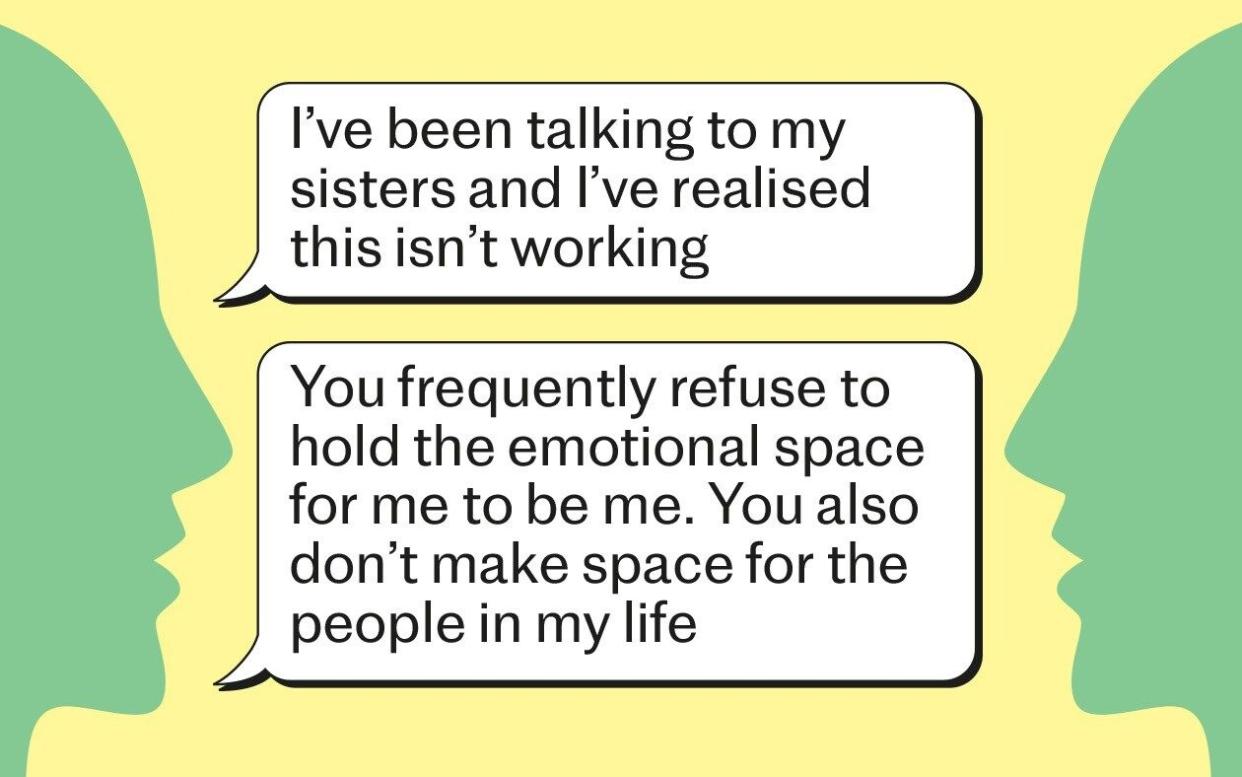The damaging rise in therapy-speak

A few days before Christmas, Tom’s phone lit up with a text from his girlfriend. They had been together for four months and while he wasn’t passionately in love, he was happy and thought the relationship was going well.
“I’ve been talking to my sisters and I’ve realised this isn’t working,” the message read. “You frequently refuse to hold the emotional space for me to be me. You also don’t make space for the people in my life.”
The text went on, detailing more of his failings in a bizarre therapy-speak he found difficult to understand. It ended with the words, “And sometimes you make me feel unsafe”. Tom, 28, was baffled – three days earlier the couple had agreed to spend New Year’s Eve together and now he was accused of being dangerous. He tried to call her, but she didn’t pick up and instead sent another message asking him to respect her boundaries.
“It really upset me,” he says. “I felt like I was being told I was some kind of predator, when the only arguments we’d had were pretty tame. The worst part was that because I had been cast as this bad guy, I wasn’t even allowed to defend myself or have a normal conversation about quite a serious relationship ending.”
Where we once considered therapy a pastime for spoilt New Yorkers, we now see it as a standard part of self-care. One adult in eight in the UK now receives mental health treatment – a rise of 60 per cent since 2004 – and millennials in particular, who can afford it, will often seek out a psychologist to help them unravel issues related to their childhood, or to look further into their predisposition for anger, stress or anxiety. This is something most older generations still find perplexing.
For many this has been a positive change, and understanding why we act the way we do is surely a good thing – but people who can’t afford private therapy or access the still-patchy care on the NHS now have a tendency to self-diagnose, which is where things can go awry.
“There has definitely been a rise in the number of theoretical discussions of psychological concepts,” says Sheri Jacobson, the founder of Harley Therapy. “But these terms are designed for therapists, not for clients, and while it’s attractive to a lot of people to be able to give labels to types of behaviour and patterns, it can lead to over-generalising, over-application and misuse – and, in turn, alienation and a one-sidedness in how we approach important conversations.”
In other words, our new-found fluency in therapy-speak can make us more selfish and more ill-mannered – but in a way that is often obscured, even from ourselves. This was illustrated with spectacular effect this month by American actor Jonah Hill – the star of films such as Superbad and Moneyball – when he was called out on social media by ex-girlfriend Sarah Brady for what she describes as “emotional abuse”.

Brady, a professional surfer, shared what she claimed were screenshots of their private messages which showed Hill saying that if she wanted to be in a relationship with him, she couldn’t go “surfing with men”, have “boundaryless inappropriate friendships with men”, post pictures “in a bathing suit”, or have “friendships with women who are in unstable places”. This is textbook controlling behaviour, but because Hill couched it in the language of therapy – he was asserting his “boundaries”; he found her behaviour “triggering” – he painted himself as the victim.
The language of the therapist’s office has long been part of the vernacular thanks to terms including “shell shock” and “inner child”, but much of the blame for this new trend – where people use the threat of their boundaries being violated to get what they want – must lie with social media.
On Instagram, accounts like the Holistic Psychologist, which is run by Dr Nicole LePera and has 6.9 million followers, explain concepts such as trauma bonding, narcissism and attachment theory to a receptive audience. On TikTok, therapists like Nadia Addesi and TherapyJeff offer tips for struggling with self-loathing, lack of boundaries and people-pleasing. Therapy-speak is even prevalent on Tinder and Hinge, with certain users specifying that they will only date people who have “done the work”.
The more we converse in this strange new language, the more ways we have to end relationships, cancel dinner plans, work from home, miss birthdays and generally do what we want under the guise of respecting our needs.
Professionals are well aware of this appropriation of their terms. A recent LinkedIn post from Chance Marshall, the co-founder of London-based mental health service the Self Space, called out the weaponisation of therapy-speak. It reads: “Not everyone who disagrees with us is ‘toxic’; not everyone who sees something differently from us is ‘gaslighting’ us; not everyone who we’re ‘triggered’ by is doing it intentionally; ‘boundaries’ aren’t tools to control others; not every difficult experience warrants diagnosis or is a pathology.”
“There is such an emphasis on the ‘self-care’ aspect of it that is actually making us more isolated and more alone, because the focus is just on the self,” explained celebrity psychologist Esther Perel in Vanity Fair.
And while Perel agrees that it can be helpful to gain clarity about a situation by naming certain behaviours, she says that using therapy-speak in an argument means there is a “danger that you lose all nuance, that you’re basically trying to elevate your personal comments and personal experience by invoking the higher authority of psychobabble.”
It’s not just romantic relationships that are involved. One much-mocked thread circulated on Twitter for creating a template on how to turn down a friend in need. “Hey! I’m so glad you reached out,” it read. “I’m actually at capacity/helping someone else who’s in crisis/dealing with some personal stuff right now, and I don’t think I can hold appropriate space for you. Could we connect [later date or time] instead/Do you have someone else you could reach out to?”
All the technical vocabulary does is obscure the slightly heartless central aim: attempting to avoid a sad pal. This is not the sort of behaviour most good psychologists try to instil in their patients. It is quite rare to hear terms like “trauma bonds” and “emotional space” in a therapy session, where frank and open conversations are encouraged and where the sort of controlling, conflict-avoidant behaviour demonstrated above would be considered issues to be resolved.
“[Therapy-speak] can mean a lot of concentration on how others should and shouldn’t behave, which isn’t particularly healthy,” says Jacobson. “Most professionals would teach that having these concrete expectations of others can be quite limiting and could ultimately lead us to feel worse. We need to understand humans are not perfect; most people will blunder or offend, but we should have some degree of acceptance.”

 Yahoo News
Yahoo News 
